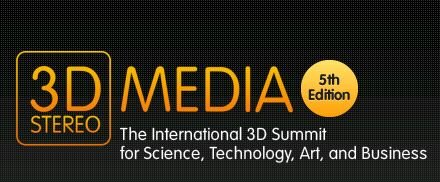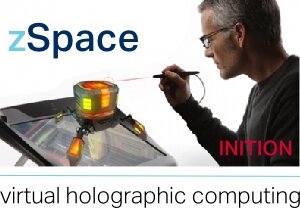The future of 3D is debated in Berlin
Recently 3D Focus travelled to Berlin to attend the Fraunhofer Heinrich Hertz Institute’s The Future of 3D Media day. The workshop was designed to showcase innovation in 3D media, consider future developments and opportunities, and exchange ideas on entrepreneurship and academia-industry partnership.
Prof. Peter Eisert of HHI and Dr George Whale, EMC^2 Industrial Liaison Research Officer from Queen Mary, University of London, were in charge of organising the day which included demos of some incredible cutting edge 3D innovations. Dr George Whale and his team will soon be launching an exciting new 3D project website of which we will announce when it launches.
Below are the highlights of the day. For George Whale’s full report click here.

Under the theme, 3D Innovation and Entrepreneurship, Ralf Schäfer, head of the Image Processing Department at HHI presented the rapid recent growth in 3D film and TV, but also commented that there is a continuing need for research to overcome technical problems and to drive production costs down.
He predicted that 3D will dominate Internet visualisation and will spread through many different application areas including medicine, surveillance and the automotive industry. He gave a preview of HHI’s 3D Innovation Centre (3D-IC) due to open early next year, a state-of-the-art facility combining an R&D lab, resource pool, communication platform and 3D technology showroom.
George Whale’s 15-minute presentation outlined the objectives of EMC^2 (Excellence in Media Computing and Communication), a new pan-European project operating in the area of 3D media processing for social networking, immersive environments, augmented reality and 3D broadcasting. Judging from what was on show during the day, the 3D Innovation Centre is going to be a very exciting place!

Sebastian Knorr, CEO of 2D to 3D conversion company imcube in Berlin, talked about high-quality conversion of 2D movies to 3D. Starting with a classification of conversion techniques, he compared offline and real-time approaches to automated conversion, outlining the steps and techniques involving in assigning depth to scene objects and solving problems such as the filling-in of background areas – necessary when a monocular view becomes binocular. (Sebastian’s talk was not intended for the public domain – however, you can find out more about imcube’s work from the company website.)
Next up was 3D broadcasting pioneer Alexander Schaefer, who captivated the audience with his account of the technical, logistical and aesthetic challenges involved in the production of a stereoscopic transmission of a musical performance by German rappers Die Fantastischen Vier (Fantastic Four). The live broadcast from Halle to 91 cinemas in 5 countries required precise synchronisation of video capture (from multiple stereo cameras), rectification, live editing, 3D encoding, transmission and screening, and was an unprecedented success, earning Alexander a gold record award.
France’s Éric Seulliet uses virtual, immersive and AR technologies to support the creation of products from collaborative design stages through to rapid prototyping and digital manufacturing. In his presentation, “La Fabrique du Futur” (Factory of the Future) Éric introduced the concept of the ‘Living Lab’ as a place for user-centred experimentation and innovation, and described how 3D technologies can support communities of users in taking concepts from the virtual to the real world.
Diego Bajo showed some of the diversity of 3D work being done at Tecnalia Medialab in Spain, including immersive heritage interpretation of historic and prehistoric environments, pre-visualisations of engineering projects like the future Basque railway network, stereoscopic visualisation for cinema, TV and mobile devices, and a range of research and educational services.
Finally, Pierre Lebreton of T-Lab in Berlin presented research conducted by him and his colleagues into 3D broadcast quality and viewer comfort. Comparing different coding schemes (Side by Side, Simulcast and MVC), the researchers found downsampling and packing using Side by Side format to be the most efficient way to transmit HD stereoscopic videos, with less bandwidth requirements than Simulcast and MVC using full resolution. Also, comparing 2D and 3D videos in cases of packet loss, the researchers observed no significant quality difference at a given packet loss rate.

The early afternoon was given over to demonstrations of some of the stunning and technically innovative work being carried out at Heinrich Hertz Institute. Workshop participants saw technologies for 3D TV content generation; the Stereoscopic Analyzer (STAN) that uses real-time image analysis to assist cameramen in shooting stereo content; the Virtual Eye Contact Engine that supports natural remote interaction by enabling proper eye contact; and the Virtual Mirror, where everyone had fun trying on virtual clothes via touch-screen interaction.

The highlight of the day was a visit to Timelab: Cinema of Tomorrow, where an array of projectors seamlessly projecting panoramic images and videos onto a large, curved screen enabled us to look down on the blue earth from a satellite drifting through space; to soar in the clouds with a supersonic jet; to find ourselves suddenly surrounded by a roaring crowd at a football match, and then an orchestra; and finally to join the audience of Alexander Schaefer’s 3D Fantastischen Vier concert – so real we could almost touch the performers.
Further Information
If you would like to know more about the EMC2 project, or to consider joining the 3D industry-research network, contact Dr George Whale on…
Tel:
Email:
www: http://www.3dlife-noe.eu/3DLife/emc2
For Dr George Whale’s full report including presentation downloads and videos from the day click here.
RELATED VIDEOS
FREE WEEKLY 3D NEWS BULLETIN – SUBSCRIBE




















Pingback: Snappointq